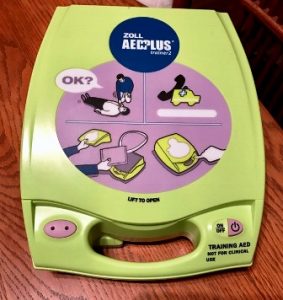 By John Orrell, Contributing Writer
By John Orrell, Contributing Writer
Region – Every school in the commonwealth — public, private, vocational, charter – will be required to have automated external defibrillators (AEDS) on their premises by July 2018 as a result of a bill passed by the Mass. State Legislature earlier this month.
Senate bill S2449 will also require that each school have a trained AED provider on site for all school events and that the equipment be readily available for use should there be a need to use it. The final sign-off on the new law is pending approval by Gov. Charlie Baker who has stated that he will sign it once it reaches his desk.
Automated external defibrillators are medical devices that analyze heart rhythms and can deliver electrical shocks that can help the heart reestablish an effective rhythm during sudden cardiac arrest, according to the American Red Cross, The Red Cross also recommends that within four minutes of a cardiac arrest there should be an AED on site and an individual trained on its use.
The bill, sponsored by State Sen. Mark C. Montigny (D- Second Bristol and Plymouth), has been welcomed jubilantly by advocates supporting the legislation, many of whom are families that have been affected by the failure to have AEDs on site that may have made a difference in saving lives. Currently, there are more than 300 schools across Massachusetts that do not have AEDs on their premises.
The development of this bill has been a long time coming; too long for many of its supporters. Gov. Deval Patrick signed Senate Bill S2132 in 2012. That law required schools to be prepared for emergencies on their campus grounds and simply “encouraged” schools to have AEDs in an accessible place, train staff to use the AED and any other medical or emergency equipment. Advocates were pleased but knew that much more stringent requirements were necessary.
John and Luann Ellsessar of Sutton are one set of parents who have fought hard for the bill’s passage. The couple lost two of their children to heart conditions. Their son Timothy died while swimming while son Mike collapsed on a football field during a game. In both instances, an AED that may have made a difference was not available.
“We don’t want to see other families go through what we’ve gone through,” said John Ellsessar. “It can happen and people often don’t realize that. People need to take responsibility. It’s not just athletes that can be at risk but people in general who are at school events as well.
“People have worked diligently in support of this bill and even in our own community kids have rallied and reached out to state officials. The process of passing the bill has been rewarding but also exhausting, but we’re thrilled for students and their families. This bill is a game-changer.”
School systems have the option to apply for grants and approach other funding sources to procure AEDs if there is contention that the new law poses a financial hardship. The devices currently cost between $800-$1,000 apiece.
“That’s a small price to pay for the potential of saving lives,” said John Ellsessar, who has rallied for the bill’s passage with other advocates known as the Heart Healthy Team.

Photo/courtesy Ellsessar family
Photo/courtesy Ellsessar family
School districts in the Community Advocate readership towns have had varied responses to requests for their district’s plans for implementation of the new law, their thoughts about it, and what their current policy is pertaining to AEDs and trained personnel on site. Two high schools, Westborough High (WHS) and Algonquin Regional (ARHS), have already put plans into place.
“We currently already have AEDs and already train our coaches. We require our coaches to be CPR/AED certified so we will continue to offer the courses to stay in compliance,” said Westborough High Athletic Director Johanna DiCarlo.
“If an emergency were to occur, we have emergency action plans that our coaches and teams go over at the start of every season to make sure the kids, coaches, athletic trainer, and any other available personnel know what to do in an emergency situation including knowing where the AEDs are and how to access them. WHS is in support of the (new) legislation.”
“At Algonquin Regional, we’ve put steps in place to establish protocols for the new law,” said Stephen Godbout, high school history teacher and advocate of the bill. “We’re trying to be ahead of the curve knowing the changes that are pending come July 2018. No parent should have to endure what so many have had happen losing their child to cardiac arrest.
“People should not be intimidated by these devices. They’re easy to use and not at all intimidating in terms of training.”
Also in support of the new legislation is ARHS Athletic Director Karrah Ellis who has been a proponent of AEDs well before the new law passed.
“We’ve already factored AEDs into our training for our coaching staff,” she said. “We’ve added AED training to our CPR classes. We have AEDs in the building and outside. We knew that changes were pending and are making sure AEDs are available in case they’re needed.”
For more information and access to S2249, go to https://malegislature.gov/Bills/189/S2449/Amendments/Senate















